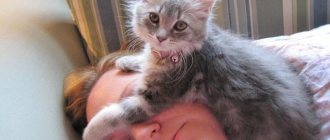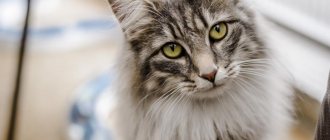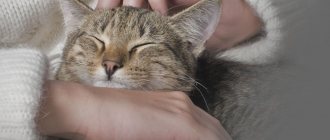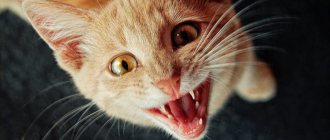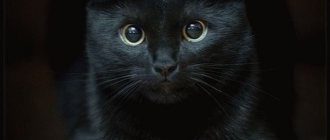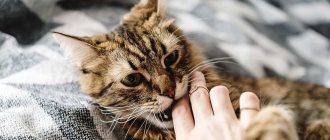How do cats show love to humans?
Yes, about the same as people. Signs of a cat's love for a person are, first of all, expressed tactilely. A cat that is not indifferent to you will trample you with its paws, associating exclusively with you the positive emotions that the kitten experiences when it “tramples,” that is, massages the mother’s belly, stimulating the mammary glands.
Cats also love to rub their faces against their owners, thereby not only showing their tenderness, but also marking them with their scent. Also, if a cat loves you, she will probably lick you and sleep with you - quite possibly even on your head.
An important indicator of love is that a cat allows unpleasant procedures, such as grooming, to be carried out on itself. Of course, no one will allow a stranger to sort out the tangle. Of course, the purring of a cat and the moments when a devoted furry animal meets its owner are all unwise, but obvious signs of a cat’s love for its owner.
There are quite a lot of examples of how cats show love for humans, and after talking with an “avid” cat lover, you will get the impression that there is no more responsive and loving animal.
There is no doubt about whether cats feel human love. Certainly! As well as his indifference or rudeness. Therefore, even if the cat expresses its feelings at the wrong moment, still try to be gentle with it.
Study: Cats Love People More Than We Thought
Contents hide
We do not advise experienced cat lovers to waste their time and read this article: you will not learn or discover anything new for yourself. Everyone else (even those who sympathize with mustachioed and striped animals) are probably captive of some stereotypes that have been around for centuries. Here is the most important of them: if a cat is friends with a person, it is only on its own terms. She will certainly favorably accept the roof over her head and tasty food provided by her owners. And she will even allow herself to be stroked - when she is ready for it.
But is it really that bad? Is life side by side with a cat like a one-way street? An interesting study was conducted by American scientists from Oregon State University (the results were published in the scientific journal Current Biology). It turns out that cats love their owners no less than man’s first friends – dogs. So modern science has destroyed the myth about the detachment and ingratitude of domestic purrs.
How was loyalty tested ? Scientists selected about eighty cats and their owners to participate in the experiments. The animals were placed in an unfamiliar room. For the first two minutes, the cats were in the room with the owners, then the latter left, leaving the cats alone. But the loneliness lasted the same two minutes. Then the owners and pets were reunited. The reaction of the purrs was recorded by impartial equipment. And here a surprise awaited the scientists: the cats differed significantly in their degree of affection. Some of the pets, having found themselves in an unfamiliar room, began to calmly explore it, while from time to time checking the presence and attention of their owner (“safe reaction”). Other cats became stressed, abruptly changed their usual behavior patterns, showed anxiety, fear, and literally clung to their owners (“unsafe reaction”). They suffered the short-term separation worst of all.
The cats that took part in the experiment were proposed to be classified as “attached to their owners” and “partially attached.” In turn, the latter demonstrated the following behavior patterns: expressed intense joy after the owner’s return; hid in the corner of the room without reacting to the owner; somehow they welcomed the return of the owner, but continued to go about their cat business.
The study was carried out in two stages: the first involved kittens aged 3 to 8 months, the second - adult cats.
Readers, of course, are interested in knowing what is the proportion of cats that demonstrate a normal reaction - that is, “attached to their owners.” The results of the experiments are impressive: 65% of cats showed a “safe reaction”, 35% - an “unsafe” reaction. Interestingly, a similar experiment was conducted with dogs and their owners. The results came out somewhat different: 58% - “safe reaction” and 42% - “unsafe”. It turns out that cats (especially adult, “established” animals) are even more attached to their owners than dogs.
What can we say, dear friends? Science has rehabilitated cats. They really love us, even more than we could have imagined. A fact that has long been proven by all cat lovers in the world, isn’t it?
Based on materials from : Do Cats Love Their Owners? Study Says a Lot More Than You'd Expect. Author: Kendall Curley. Source: petmd.com Photo: pixabay.com
Lucky in life: what kind of people do cats love?
On the one hand, cat love, like any other, may seem irrational. Probably every cat lover has a couple of completely inexplicable stories about cat sympathies. When, for example, the owner feeds the cat and pays more attention to him, but he still sleeps only with the owner, who disappears at work. A cat loves a person, and everything here is just mystic.
It often happens that literally in the first weeks of life, a kitten chooses from the whole family a person he likes and only then devotes his whole life to him, as they say, “the beautiful impulses of his soul.”
But still, mysticism does not play the main role in what kind of people cats love. Cat sympathies are, to a large extent, associated with certain human behavior. For example, adult cats are attracted to (or at least not irritated by) people with a moderate timbre of voice, a balanced, self-controlled character, and calm behavior. Who knows, maybe the cat will like you just by lying in front of the TV for a long time?..
A good way to make friends with a cat is not to look at it closely, but when you catch its eye, blink a few times. For animals, a fixed, unblinking gaze is a sign of a challenge, a threat, and it is unlikely that you will thus become one of the people that cats and cats love. And when you blink, you demonstrate your loyalty, peaceful intentions.
Amazing facts about cats
Why does my cat love my boyfriend more than me?!
You take care of your cat as best you can, cleaning, petting, entertaining and, above all, feeding. Meanwhile, this “traitor” clearly prefers someone else? And he does not hide this sympathy! It's not fair!
Cats show us love in many ways. Some of the most obvious gestures are cuddling, purring, cat rubbing, licking. We love knowing that our pets love us back. And we are often indignant when the object of sympathy becomes someone other than us, and we are treated only as... openers of doors and cans! What is the reason?
Cats are animals with character. They have their own preferences regarding a place to sleep, type of food, allowed petting. They also do not hide their sympathy for people. Yes, it's true - some cats have their favorite people. Of course, there are Velcro cats that are equally affectionate to everyone. However, most purrs choose one individual, rewarding him with special privileges and recognition. But why is this person not you? It often happens that a cat prefers your friend instead of a caring nanny...
It might seem that the person who grooms the cat every day, cleaning its litter box, washing its bowls and, above all, replenishing them, should be the most beloved object. After all, the shortest way to the heart is through the stomach. Meanwhile, there are many possible reasons why this is not the case for skittish cats.
Because cats have different personalities, the bond they form with their caregiver likely comes from a complex combination of several factors: genetics, personality and experience. Thanks to its innate independence, a cat's bond with a person is based on much more than just feeding.
Some prefer peace and quiet, others need to be in the center of events. If you are an energetic person, there are always a lot of you everywhere and at the same time you do not spare your voice - an introverted cat may feel threatened, anxious, and stressed. Since people tend to unite on the principle of opposites, your partner may represent a set of completely opposite traits. If so, you already know the answer to the question of why your cat chooses your boyfriend/girlfriend. And vice versa. If you don't like the activity, the cat gets bored in your company, then she is looking forward to the appearance of someone with whom she can play. With a high degree of probability, purrs will stay closer to those whose temperament is close to their own.
The behavior of an adult cat is greatly influenced by its childhood. Adequate socialization, good memories of the person. Cats have excellent memory. Maybe things weren't always rosy between you and your pet? Maybe you hooked him with something? Perhaps for some reason the cat does not treat you as a friend. Considering your conscience and improving your relationship with each other and creating positive experiences can fix your relationship. Until then, the cat may instinctively look for a soul mate in someone else.
There are breeds that are known to choose one loved one and focus most of their feelings on him. Others can successfully become friends with the whole family and even with anyone they meet again. As a rule, Bengal, Siberian and Siamese cats are monogamous.
Although the vast majority of cat guardians are women, cats tend to choose men as their favorites. They, as a rule, more clearly respect the cat's personal space, do not force themselves on the pet, sometimes behave quieter than women, do not cooze with cats as with children, do not pull them out of hiding, and do not carry them in their arms. One theory is that cats also prefer male scent. It tends to be more natural than women's perfumes. However, this is just a guess. The variety of human characters is as wide as that of cats. It usually depends on the pet's personality.
Who do cats ultimately prefer?
Dogs are loyal and obedient, cats are the opposite. They look out for their own interests and are not subject to hierarchy. By nature, they are less sociable and independence-oriented. However, like barking pets, they become attached to people. Although they show it in a completely different way. They may treat a person with sympathy, but simply put: they love some more, others less, and others they bypass. However, not all cats form a special bond with one person and many may not even have a pet of their own.
Although it may seem unnatural and unfair, the person who feeds and cares for the cat the most will not always be its exclusive favorite. Domestic tigers, like people, have their own likes and dislikes, the reasons for which are sometimes difficult for us to decipher.
If a person loves cats...
If a person is loved by cats, it means that he is not such a lost soul! Animals, of course, are not psychics, but they are unlikely to show their best feelings in front of some ungrateful egoist.
Typically, cat people are characterized as sympathetic, perhaps sometimes sentimental people, with a high sense of responsibility, inclined towards family life and caring for loved ones.
Sometimes it is more difficult to earn the sincere love of a cat than to earn human sympathy - if you have succeeded, you are the right person, and it is quite possible to do business with you!
Igor Kaverin
A psychologist explained why some parents love animals more than their own children.
Very often, especially nowadays, we observe a truly fanatical craving for animals. It is noticeable not only in commercials, but also in other media projects. Let’s not dwell on the above-mentioned advertisements or avatars of pages on social networks, where the faces of pets are teeming: psychologist Anna Negi, in a conversation with FAN , will point out the root of the problem.
“Everyone has friends or relatives who have acquired pets, cherish them as if they were their own children, and sometimes even more reverently, perhaps with the manifestation of pathological hoarding. However, this parental guardianship in relation to pets is gaining momentum and, as a result, extends beyond private cases. Animal protection organizations are formed, activists and public figures appear. We will not rush to say that they all have the same causal basis, but in most cases, yes,” explained Anna Negi.
From personal archive - Anna Negi /
According to her, individual cases represent origins, like the historical formation of states. When family hierarchies and relationships served as a prototype for future tribes, and later states, private psychological pathologies may tend to spread much more widely and merge into entire organizations and even parties.
“So, in the 70-80s of the last century and even to this day, there is such a phenomenon as dog-haiting. This is a radically aggressive attitude towards animals, when a group of people is engaged in the extermination of dogs in order to protect themselves and society from possible attacks. This radical extreme has given rise to other opposite extremes: “dog witches” (they put dogs above people, even if these people have become victims of animal attacks, taking the principled position of a lawyer), “cat demons” who breed cats in their limited apartment, causing inconvenience to neighbors.” , added Anna Negi.
It should be understood that in many areas of human activity extremes give rise to extremes. This is a problem of a socio-psychological vector, and creative entrepreneurs have already found ways to turn this psychological shortcoming of society into an instrument of profit, playing on its feelings. But this is a completely different story, the psychologist is sure.
pixabay.com/Andrés Carlo
“If we focus on the essence of manic attention to animals on the part of individuals and animal rights organizations (without touching on their financial and motivational side), but based on a purely psychological root cause, we can safely highlight the following formula. This is the desire to compensate for the lack of something. And this “something” may be a lack of feelings, attention, critical imperfection of family relationships that need reform. This could be an unsuccessful romance, trauma from insults or betrayal from loved ones, and so on,” said the psychologist.
The common aphorism “The more I get to know people, the more I love animals” just highlights this problem of mistrust in each other. And these boundaries of rejection are constantly expanding, creating an insurmountable chasm, Negi believes.
She added that experience, like history, maps the path for the future. However, if you do not try to correct psychological problems, do not understand yourself and do not build a bridge between yourself and reality, it will be reminiscent of navigating along this drawn map, only without a compass for an adequate assessment of the situation.

